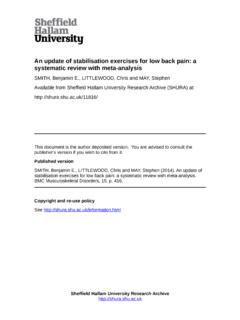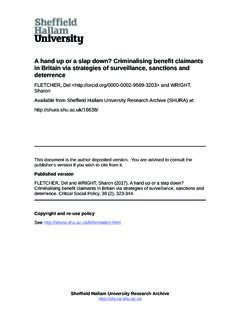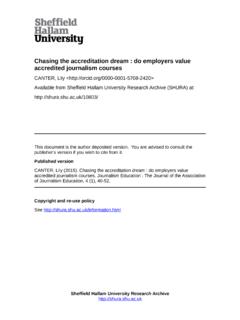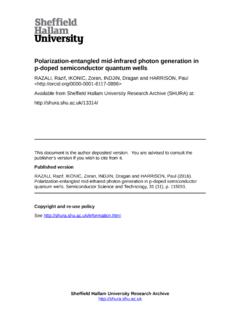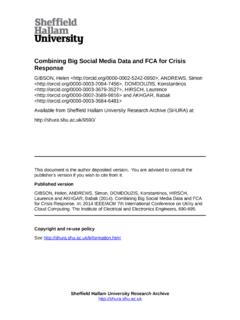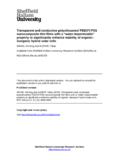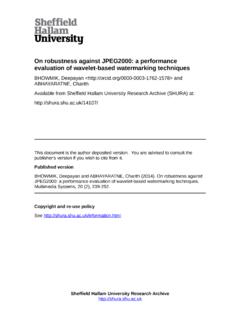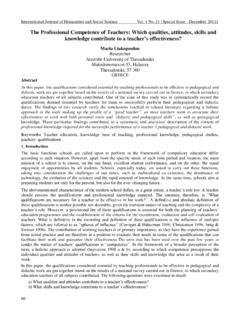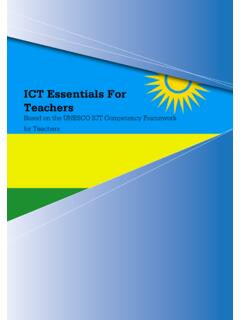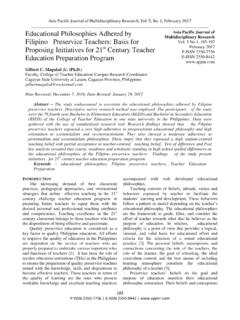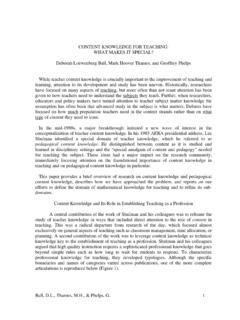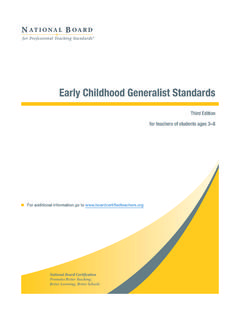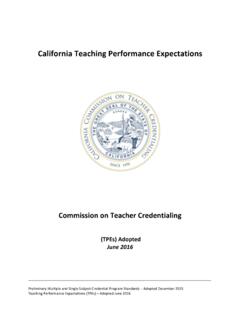Transcription of Improving subject knowledge and subject pedagogic ...
1 Improving subject knowledge and subject pedagogic knowledge in employment based secondary initial teacher training in EnglandEVANS, A., HAWKSLEY, F., HOLLAND, M. R. and CAILLAU, from Sheffield Hallam University Research Archive (SHURA) at: document is the author deposited version. You are advised to consult the publisher's version if you wish to cite from versionEVANS, A., HAWKSLEY, F., HOLLAND, M. R. and CAILLAU, I. (2008). Improving subject knowledge and subject pedagogic knowledge in employment based secondary initial teacher training in England. In: Annual Conference of the Association of teacher Education in Europe, Brussels, 23-27 August 2008.
2 Copyright and re-use policySee Hallam University Research 1 Improving subject knowledge and subject pedagogic knowledge in Employment- based Secondary Initial teacher Training in England. Paper delivered at the Annual Conference of the Association of teacher Education in Europe, Vrije Universiteit Brussel August, 2008. Angie Evans, Fiona Hawksley, Mike Holland, Ihsan Caillau. Centre for Education and Inclusion Research, Sheffield Hallam University, UK. Abstract Each year in England about 6,000 trainee teachers qualify by undertaking an employment-based initial teacher training route (EBITT), where training is mainly school based.
3 Government inspectors have found that trainees on this route are weaker in subject knowledge and subject pedagogic knowledge compared to trainees following the more traditional one year training course (PGCE) of which about a third of course time is University based. EBITT providers are currently seeking to improve the subject knowledge aspect of training. To support this work the TDA have published a model for developing trainees' subject knowledge for teaching and suggest that providers review their provision against the model. In addition EBITT providers must also meet a new requirement that the total training time should be a minimum of 60 days.
4 This new requirement presents a challenge to EBITT providers as most of the subject knowledge enhancement will have to be school-based. This paper seeks to find out: how trainee teachers acquire subject and subject pedagogic knowledge while based in a school and whether teaching staff in schools have the required subject and subject pedagogic knowledge and skills for this enhanced role. Data have been collected from trainees, school-based mentors, school-based Initial teacher Training Coordinators and University assessors over a one year period. Data about the way trainees acquire subject knowledge was interpreted against the TDA model.
5 The study finds that trainees acquire subject and subject pedagogic knowledge in a variety of highly individualistic ways that suggests that the TDA model only partially explains what is happening in practice and there is a significant training need to ensure schools are well equipped to deliver high quality subject focussed training. 2 Background teacher Training in England has undergone significant change in recent years. Possibly the most significant is the introduction of professional standards in Qualifying to Teach (TDA, 2002) which gave greater responsibility to schools, the removal of the "one size fits all" approach to training opening the way to a increased variety of training options and a more central role for school-based trainers.
6 The findings given in this paper are based on data collected from trainee teachers during a one year programme of school based teacher training organised between a large University and three Local Authorities. Trainee teachers are all employed by schools as unqualified teachers and follow the Graduate teacher Programme (GTP) and have an individual training plan. Most of the subject knowledge and subject pedagogic is delivered by school staff. Individual training plans provide the necessary flexibility to account for the varied and diverse needs of trainees including subject knowledge and subject pedagogic knowledge .
7 The EPPI Centre Review of Research (2006) into Individual teacher Training found that there were no studies in the literature that considered the operation or provision of flexible and responsive ITT as a general issue. Most of the 24 studies reviewed were small scale and written by ITT tutors researching their own programmes and few of the studies sought students' views. Importantly these studies did not consider the question of effectiveness. There is also tension between the providing a flexible route with students taking responsibility for their own learning and the constraints of reaching government defined standards and competences.
8 As Lawson and Harrison (1999) suggest trainees can vary the route but not the direction of travel. A relatively new feature of GTP is that a significant number of students now have prior experience of working in a school support role: typically as a teaching assistant, cover supervisor or in sports development. These posts have become increasingly a popular career for graduates considering a career in teaching. Schools generally get a good deal - these support staff learn fast, are able to support learning in specialist subjects and often relate well to pupils. They do not however have the "authority role" of the teacher .
9 Success in these roles means that schools will often support them if they wish to train as a teacher and they clearly start the programme with enhanced knowledge of schools and how children respond to learning. However as Mayotte (2003) reports, previous career success does not guarantee success as a teacher . pedagogical content knowledge (PCK) is a concept that has developed over time and sometimes is regarded by teachers as part of the "common sense knowledge about teaching." Our experience is that although teachers (and mentors supervising training) recognise that they are helping their trainee to acquire PCK they are often doing so from a practical view of what works for them - passing on experience.
10 Our own perception when discussing this issue with mentors and ITT coordinators is that that there seems to be wide variation in the depth and rigour in the way in which PCK is delivered and that school based tutors need support in this aspect of their role. The challenge with novice teachers is how to help them to make rapid progress in acquiring PCK. Educators have been concerned about his for well over one hundred years. Bullough (2001) cites a quote from Parr (1888) 3 An analysis of the process of teaching shows that there is a special knowledge in each subject which belongs to instruction. This is quite distinct from academic knowledge .
